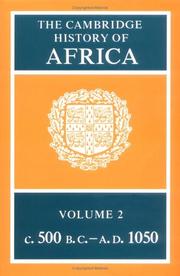| Listing 1 - 1 of 1 |
Sort by
|

ISBN: 0521207010 0521215927 0521209811 0521204135 052122215X 9780521222150 9780521215923 9780521209816 9780521204132 9780521207010 9781139054560 9781139054591 9781139054577 9781139054584 9781139054553 Year: 1975 Publisher: Cambridge ; New York : Cambridge University Press,
Abstract | Keywords | Export | Availability | Bookmark
 Loading...
Loading...Choose an application
- Reference Manager
- EndNote
- RefWorks (Direct export to RefWorks)
The five and a half centuries described in this volume were those in which Iron Age cultures passed from their early and experimental phases into stages of maturity characterized by long-distance trade and complex, many-tiered political systems. In Egypt and North Africa it was a period of religious and cultural consolidation when the Arabic language and the faith of Islam were adopted by the majority of the indigenous Copts and Berbers. In the sub-Saharan Savanna it was a period rather of penetration when Muslim merchants and clerics built up small but significant minorities of Negro African converts. Muslim migrants conquered the Nilotic Sudan, encircled Christian Ethiopia and settled the coastline of eastern Africa. Intercontinental trade developed across the whole width of the Sahara and also toward the Indian Ocean ports. During the last century and a half of the period the Portuguese opened the Atlantic coasts and competed with the Muslim traders of the Indian Ocean. But throughout the period African states, large and small, were strong enough, relatively, to control their visitors from the outside world. The main significance of the outsiders, whether Muslim or Christian, was as literate observers of the African scene.
Africa --- History. --- 960 --- -#SJ/LH/(6) --- 960 Geschiedenis van Afrika --- Geschiedenis van Afrika --- History --- History of Africa --- Afrique --- --Histoire --- --History --- 960 History of Africa --- Africa - History --- Histoire --- -History --- Egypte --- Ethiopie --- Afrique occidentale --- Afrique orientale --- Afrique centrale --- Afrique du nord --- Afrique du sud --- 19e siecle --- 18e-20e siecles --- Jusqu'a 1889 --- 19e-20e siecles --- Soudan --- 7e-11e siecles --- Prehistoire-20e siecle --- Jusqu'a 647 --- 8e-9e siecles --- Jusqu'au 11e siecle --- Population --- Geographie humaine --- Prehistoire --- 16e-18e siecles --- 17e-19e siecles --- 13e-19e siecles --- Relations exterieures --- Etats-unis --- 11e-17e siecles
| Listing 1 - 1 of 1 |
Sort by
|

 Search
Search Feedback
Feedback About
About Help
Help News
News